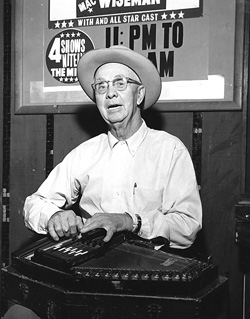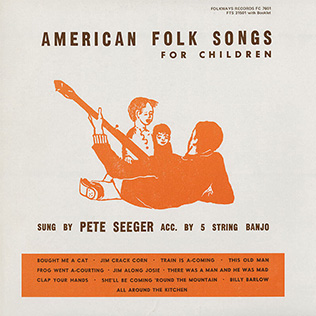
Huddie William Ledbetter, better known by the stage name Lead Belly, was an American folk and blues singer notable for his strong vocals, virtuosity on the twelve-string guitar, and the folk standards he introduced, including his renditions of "In the Pines", "Goodnight, Irene", "Midnight Special", "Cotton Fields", and "Boll Weevil".
"St. James Infirmary" is an American blues and jazz standard that emerged, like many others, from folk traditions. Louis Armstrong brought the song to lasting fame through his 1928 recording, on which Don Redman is named as composer; later releases credit "Joe Primrose," a pseudonym used by musician manager, music promoter and publisher Irving Mills. The melody is eight bars long, unlike songs in the classic blues genre, where there are 12 bars. It is in a minor key, and has a 4
4 time signature, but has also been played in 3
4.

Anthology of American Folk Music is a three-album compilation, released in 1952 by Folkways Records, of eighty-four recordings of American folk, blues and country music made and issued from 1926 to 1933 by a variety of performers. The album was compiled from experimental film maker Harry Smith's own personal collection of 78 rpm records.

Ernest Van "Pop" Stoneman was an American musician, ranked among the prominent recording artists of country music's first commercial decade.

Bascom Lamar Lunsford was a folklorist, performer of traditional Appalachian music, and lawyer from western North Carolina. He was often known by the nickname "Minstrel of the Appalachians."
"He Never Said a Mumblin' Word" is an American Negro Spiritual folk song.
"Drunken Sailor", also known as "What Shall We Do with a/the Drunken Sailor?" or "Up She Rises", is a traditional sea shanty, listed as No. 322 in the Roud Folk Song Index. It was sung onboard sailing ships at least as early as the 1830s.

Dust Bowl Ballads is an album by American folk singer Woody Guthrie. It was released by Victor Records, in 1940. All the songs on the album deal with the Dust Bowl and its effects on the country and its people. It is considered to be one of the first concept albums. It was Guthrie's first commercial recording and the most successful album of his career.
The song "Great Green Gobs of Greasy, Grimy Gopher Guts" is a children's public domain playground song popular throughout the United States. Dating back to at least the mid-20th century, the song is sung to the tune of "The Old Gray Mare". The song, especially popular in school lunchrooms and at summer camps, presents macabre horrors through cheerful comedy while allowing children to explore taboo images and words especially as they relate to standards of cleanliness and dining. Many local and regional variations of the lyrics exist, but whatever variant, they always entail extensive use of the literary phonetic device known as an alliteration which helps to provide an amusing description of animal body parts and fluids not normally consumed by Americans.

The Titanic has played a prominent role in popular culture since her sinking in 1912, with the loss of over 1,500 of the 2,200 lives on board. The disaster and the Titanic herself have been objects of public fascination for many years. They have inspired numerous books, plays, films, songs, poems, and works of art. The story has been interpreted in many overlapping ways, including as a symbol of technological hubris, as basis for fail-safe improvements, as a classic disaster tale, as an indictment of the class divisions of the time, and as romantic tragedies with personal heroism. It has inspired many moral, social and political metaphors and is regularly invoked as a cautionary tale of the limitations of modernity and ambition.

Invisible Republic: Bob Dylan's Basement Tapes (1997) is a book by music critic Greil Marcus about the creation and cultural importance of The Basement Tapes, a series of recordings made by Bob Dylan in 1967 in collaboration with the Hawks, who would subsequently become known as the Band. (ISBN 0-8050-5842-7)
"Worried Man Blues" is a folk song in the roots music repertoire. It is catalogued as Roud Folk Song Index No. 4753. Like many folk songs passed by oral tradition, the lyrics vary from version to version, but generally all contain the chorus "It takes a worried man to sing a worried song/It takes a worried man to sing a worried song/I'm worried now, but I won't be worried long." The verses tell the story of a man imprisoned for unknown reasons "I went across the river, and I lay down to sleep/When I woke up, had shackles on my feet", who pines for his lost love, who is "on the train and gone." The melody in 4/4 timing has a strong resemblance to "The Battle Hymn of the Republic", which is in 6/8 timing.
"I Wish I Was a Mole in the Ground" is a traditional American folk song. It was most famously recorded by Bascom Lamar Lunsford in 1928 for Brunswick Records in Ashland, Kentucky. Harry Smith included "I Wish I Was a Mole in the Ground" on his Anthology of American Folk Music released by Folkways Records in 1952. The notes for Smith's Anthology state that Lunsford learned this song from Fred Moody, a North Carolina neighbor, in 1901.
"The Ballad of Casey Jones", also known as "Casey Jones, the Brave Engineer" or simply "Casey Jones", is a traditional American folk song about railroad engineer Casey Jones and his death at the controls of the train he was driving. It tells of how Jones and his fireman Sim Webb raced their locomotive to make up for lost time, but discovered another train ahead of them on the line, and how Jones remained on board to try to stop the train as Webb jumped to safety. It is song number 3247 in the Roud Folk Song Index.
"Cumberland Gap" is an Appalachian folk song that likely dates to the latter half of the 19th century and was first recorded in 1924. The song is typically played on banjo or fiddle, and well-known versions of the song include instrumental versions as well as versions with lyrics. A version of the song appeared in the 1934 book, American Ballads and Folk Songs, by folk song collector John Lomax. Woody Guthrie recorded a version of the song at his Folkways sessions in the mid-1940s, and the song saw a resurgence in popularity with the rise of bluegrass and the American folk music revival in the 1950s. In 1957, the British musician Lonnie Donegan had a No. 1 UK hit with a skiffle version of "Cumberland Gap".

Moses Asch was an American recording engineer and record executive. He founded Asch Records, which then changed its name to Folkways Records when the label transitioned from 78 RPM recordings to LP records. Asch ran the Folkways label from 1948 until his death in 1986. Folkways was very influential in bringing folk music into the American cultural mainstream. Some of America's greatest folk songs were originally recorded for Asch, including "This Land Is Your Land" by Woody Guthrie and "Goodnight Irene" by Lead Belly. Asch sold many commercial recordings to Verve Records; after his death, Asch's archive of ethnic recordings was acquired by the Smithsonian Institution, and released as Smithsonian Folkways Records.

Woody At 100: The Woody Guthrie Centennial Collectionis a 150-page large-format book with three CDs containing 57 tracks, including Woody Guthrie's most important recordings such as the complete version of "This Land Is Your Land," "Pretty Boy Floyd," "I Ain't Got No Home in This World Anymore," and "Riding in My Car." The set also contains 21 previously unreleased performances and six never-before-heard original songs, including Woody's first known—and recently discovered—recordings. It is an in-depth commemorative collection of songs, photos and essays released by Smithsonian Folkways in June 2012.

American Folk Songs for Children is a studio album released by Pete Seeger in 1953 by Folkways Records. It was Seeger's first solo album.

"When the War Was On" is a call and response blues song recorded in 1929 by Blind Willie Johnson and Willie B. Harris, who is thought to have been his first wife. Johnson plays bottleneck guitar, and sings throughout in his "growl" voice; Harris sings soprano.
Jeff Place is the Grammy Award-winning writer and producer and a curator and senior archivist with the Smithsonian Center for Folklife and Cultural Heritage. He has won three Grammy Awards and six Indie Awards.










